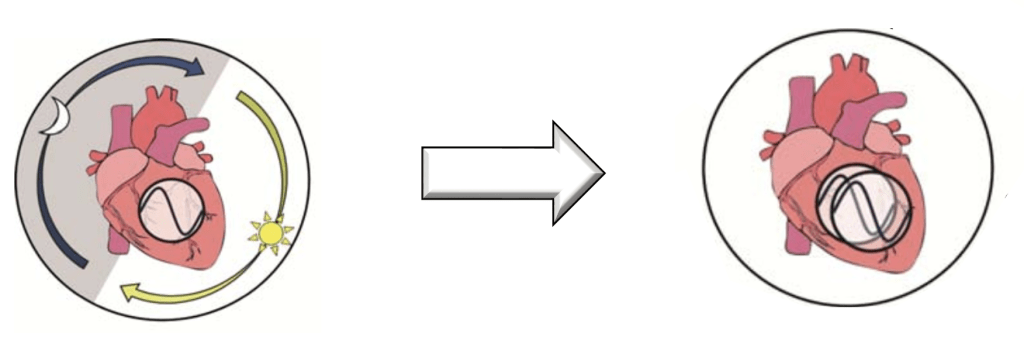
Normal Circadian Rhythms
Disrupted Circadian Rhythms
Circadian rhythms are an internal process that regulates our diurnal cycle.
The suprachiasmatic nucleus (SCN) also referred to as the primary clock is found within our hypothalamus. This clock synchronizes the rest of the internal clocks in the body to the environmental conditions by transmitting time of day signals to peripheral tissues such as other regions in the brain, our heart, vascular system, kidneys, etc. This helps to entrain the body to our outside environment so that we can be at our healthiest when we are at rest or are active, when we sleep or are awake.
Circadian rhythms play a critical role in influencing our cardiovascular physiology, such as heart rate and blood pressure. The healthy pattern of our daily heart rate and blood pressure is a peak/rise in the early morning, followed by a gradual decline towards the night.
Cardiovascular disease is a leading cause of death worldwide. Recent studies at Dr. Martino’s lab have revealed that circadian rhythms are fundamentally important for our health. Moreover, disturbance of circadian rhythms has a profound adverse effect on the cardiovascular system, causing and/or exacerbating our leading causes of death such as myocardial Infarction (heart attack), ventricular arrhythmias, stroke, and sudden cardiac death. Disruption of circadian rhythms is especially relevant to individuals who shift work. According to Statistics Canada, approximately 28% of the Western workforce operates outside of conventional daytime hours. Most recently, Dr. Martino’s group has focused on the application of circadian biology to clinical cardiology, designing new treatments for cardiovascular disease. Through this work they are pioneering a new field of medicine, termed Circadian Medicine, which will lead to longer and healthier lives.
In parallel with our goals, we are enthusiastic about growing our research and inviting young, inquisitive graduate students to apply to our lab. Please send an unofficial copy of transcripts, CV, and a short statement of interest to tmartino@uoguelph.ca. Priority is given to individuals already in Canada.


